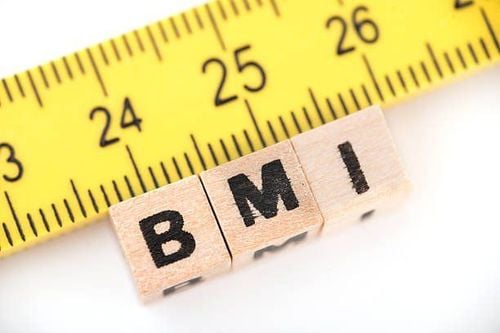This is an automatically translated article.
While many people struggle to lose weight, there are also many who have difficulty gaining weight. The cause of difficulty gaining weight can sometimes come from genetics, lifestyle habits or even medical problems.
1. Reasons why it's hard for you to gain weight
If you are a person who has difficulty gaining weight, you can learn the following main reasons:
1.1. Hyperthyroidism makes it difficult to gain weight An overactive thyroid gland, also known as hyperthyroidism, causes an excess of thyroid hormone in the body. Thyroid hormone is responsible for many elements of human metabolism, including the regulation of metabolic rate.
People with hyperthyroidism have an overactive metabolism and often burn more calories during the day. Without proper medication, hyperthyroidism can make it difficult to gain weight, eat a lot, and still not be fat.
1.2. Type 1 diabetes makes it hard to gain weight Type 1 diabetes is an autoimmune condition in which the body destroys cells in the pancreas responsible for producing insulin.
Insulin is the hormone responsible for glucose metabolism. When type 1 diabetes occurs and is not controlled, it causes blood sugar levels to rise, which is then excreted in the urine. This excess glucose excretion can lead to unintentional weight loss.
1.3. Inflammatory bowel disease can make it difficult for you to gain weight Inflammatory bowel disease is a general term for a range of conditions characterized by inflammation of the intestines. These conditions include Crohn's disease and ulcerative colitis, which can have a negative impact on your ability to maintain weight.
These conditions can limit the types and amounts of food that you eat. They can also cause frequent diarrhea, which can lead to weight loss in some cases.

Một số bệnh lý đường tiêu hóa có thể làm cho bạn khó tăng cân
1.4. Eating disorders make it hard to gain weight There are many different types of eating disorders, and people with restrictive eating disorders can have a hard time maintaining a healthy weight.
The worst form of eating disorder is anorexia nervosa which causes extreme weight loss and sometimes the patient is not able to gain weight at all. Other conditions, such as bulimia, can make it difficult for a person to keep enough calories to maintain weight.
1.5. Medicines and treatments that can make it difficult for you to gain weight Some medications and treatments that cause loss of appetite, nausea, vomiting, and diarrhea can make it difficult to maintain a healthy weight.
For example, drugs like antibiotics and treatments like chemotherapy are known to cause gastrointestinal side effects, making it possible for patients to lose weight and have difficulty gaining weight during the procedure. treatment course.
2. Weight gain strategies for people who have difficulty gaining weight
In addition to a pre-existing medical condition, some people find it harder to gain weight than others. If you're having trouble gaining weight, you can make certain lifestyle changes that give yourself the best chance to gain weight in a healthy way.
2.1. Exercise to increase muscle mass Exercising to increase muscle mass and increase body weight is very important for overall health, but you need to strictly adhere to the exercise regimen given by experts and instructors.
Since muscle weighs more than fat, weight training can help you increase your overall weight without adding fat.
2.2. Eat high-calorie dishes Meals with lots of whole grains and healthy fats tend to provide more calories than meals that include foods with fewer calories, such as lean meats and vegetables.
Start each meal with at least one cup of whole grains and try to incorporate a variety of fats, such as oils, nuts or other spices. Finally, end the meal with some protein and at least a few servings of vegetables.

Ngũ cốc nguyên hạt và chất béo lành mạnh có thể cung cấp nhiều calo hơn cho người dùng
2.3. Drinks and Supplements If you're still struggling to meet your daily calorie goals, certain beverages and supplements can help you add in your daily calories.
Certain beverages tend to contain more calories and are aimed at maintaining weight for people who cannot consume regular food. In addition, some drinks are specially formulated to increase body mass.
2.4. Don't drink a lot of water before a meal For many people, drinking water before a meal can help them avoid overeating, but it can backfire if you're trying to gain weight.
It is important that you drink water regularly during the day, but if you have trouble eating because you are full, avoid drinking too much water before meals.
3. How do you know if you are underweight?
Body mass index (BMI) is a health screening tool commonly used to determine someone's overall body composition based on their height and weight.
According to the Centers for Disease Control and Prevention (CDC), you are considered underweight if your BMI is less than 18.5.
It's important to note that there are many factors that affect overall health and BMI should not be used as a single measure of someone's health. Even if you're "underweight" according to the BMI chart, that doesn't mean you're "unhealthy." However, if you are underweight and have difficulty gaining weight, it may be time to see your doctor.

Dựa vào bảng chỉ số khối cơ thể (BMI) có thể biết bạn có thiếu cân hay không
4. Go to the doctor if you have difficulty gaining weight
It is normal for your body weight to fluctuate within a small range. However, if you notice that you have unexplained weight loss that is not the result of intentional dietary or lifestyle changes, you should see your doctor to find out the cause.
Your doctor can review your health history and perform the appropriate tests to determine if a health condition is causing the change in weight. If you don't have a medical condition that's making it difficult for you to lose weight or gain weight, your doctor may refer you to a dietitian. Dietitians can help create a nutritionally complete eating plan to help you gain weight in a healthy way.
Healthy weight gain often involves choosing the right balance between healthy high-calorie foods and building muscle through weight training. For many people, making these simple changes is enough to start seeing an increase in weight and BMI.
However, if you have trouble gaining or keeping it off, even with a change in your diet, schedule an appointment. Your doctor can help you determine if there are any underlying medical conditions that make it difficult for you to gain weight and can refer you to a dietitian if needed.
Currently, Vinmec International General Hospital has implemented a general health checkup package for all subjects and genders. The overall health check helps to detect risk factors for disease, thereby adjusting and changing to prevent disease from occurring.
The examination is always performed by a team of qualified doctors with many years of experience combined with modern equipment and machinery to help bring accurate examination results, ensuring the best health. for customers.
Please dial HOTLINE for more information or register for an appointment HERE. Download MyVinmec app to make appointments faster and to manage your bookings easily.
Reference source: livescience.com - healthline.com












